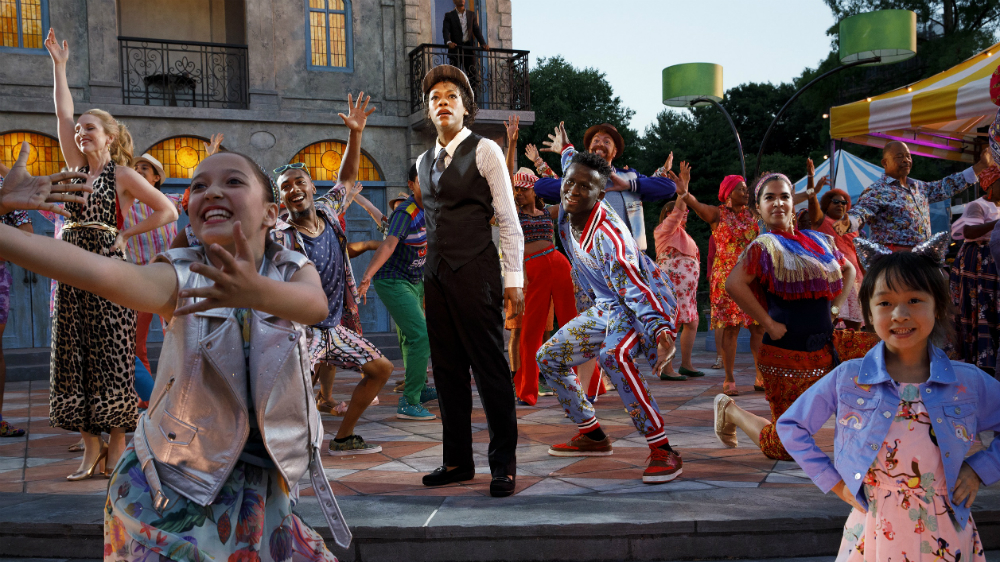Off Broadway Review: ‘Twelfth Night’ in Central Park
By Nicole Serratore
LOS ANGELES (Variety.com) – Kwame Kwei-Armah and Shaina Taub’s musicalized “Twelfth Night” is the kind of outdoor summer theater that transcends bad weather. Even if the skies crackle with lightning and showers soak you in your seat (as happened to this critic), you’ll still leave Central Park’s Delacorte Theater beaming. The co-creators take Shakespeare’s themes and wrap them in an ebullient package, making sure everything about this production — from the inclusive casting to the use of American Sign Language to the invitation to the audience to come mingle with the cast on stage at the start — says “welcome.” With a score of catchy tunes and ardent performances, it’s a happy marriage of a classic play with a contemporary execution.
Presented here as part of the Public Theater’s Free program, this “Twelfth Night” was created through Public Works, the initiative that sees members of community groups like the Domestic Workers Union, Children’s Aid and the Military Resilience Foundation join a large performing ensemble on stage alongside Broadway actors including, in this case, Tony winner Nikki M. James (“”).
The production, co-directed by Oskar Eustis and Kwei-Armah, mirrors the spectrum of faces you see on the subway, but with a lot more bops and smiles. One performer wears a head scarf while another sports a sparkly cat-ear headband; seniors in fabulous hats sit alongside children with curious faces. Yes, some dancers will be off the beat. The occasional line reading will be a bit stiff. But it’s this kind of imperfection that gives the show its value and makes it a showcase for something dearer than precision: community.
James plays the shipwrecked young woman Viola, who has lost (or so she thinks) her twin brother Sebastian (Troy Anthony) during a storm. To survive on this foreign shore, she poses as a man, Cesario, to become assistant to Duke Orsino (Ato Blankson-Wood). Orsino is in love with Olivia (Nanya-Akuki Goodrich) but Cesario is sent as Orsino’s emissary to woo on his behalf. Olivia falls for Cesario while Viola falls for Orsino. Throw in Olivia’s troublesome uncle Sir Toby Belch (Shuler Hensley) conspiring with Olivia’s maid Maria (Lori Brown-Niang) in a scheme to humiliate Olivia’s advisor Malvolio (Andrew Kober), not to mention the court fool Feste (Taub), and you have a breezy story of mistaken identity, miscommunication, self-discovery and love.
The co-directors create bursts of energy as they cram the stage with the colossal ensemble and draw gratifying performances from the cast. James brings thoughtfulness and vulnerability to her hero; Hensley is a hoot as a heckling drunkard; Kober is delightfully imperious and Brown-Niang delivers a delicious cackle as a bubbly troublemaker.
This “Twelfth Night” sports a unified eclecticism in choreography, music, and design. Choreographer Lorin Latarro designs big, bold dance numbers that pull from broad references including Busby Berkeley, tap, dabbin, and moonwalking. Taub composes in a mix of musical genres encompassing a New Orleans funeral march, jazz ballads (where Taub herself sounds like Norah Jones), pop, R&B, and a 1930’s-style American Songbook number. But there’s nothing dissonant about this creative patchwork; here these various styles suggest the distance between them is less than we thought — and serves as another aspect of the show’s eye on inclusivity.
Also in service to the communal vibe, the cast uses performance ASL (American Sign Language) within the show, although it works more as a reminder to a hearing audience that ASL speakers exist among us rather than serving as a useful interpretation. (There are also designated ASL-interpreted and open-captioned performances on the schedule.)
Taub’s songs work to unpack Viola’s gender identity as well as her path to self-discovery. While the play has always involved Viola in “disguise,” here she stops and contemplates who she is when she’s not wearing a dress. “Is it as simple as putting on a pair of pants?” she asks. “Am I more myself?” Throughout the musical, she incrementally uncovers her strengths, skills, and value, all while pondering her sense of gender.
In other productions we often see Viola putting on a dress or pulling off a wig to show Orsino her “true” appearance in the finale. But here, Viola does not “reveal” herself to Orsino by reconstructing a more female look. Orsino (and the audience) have fallen for her in a three-piece suit (in which James defines the word dapper), and she’s grown to love herself like this. She takes off her suit jacket but stands before Orsino as he’s come to know her — in vest, pants, and short hair. They embrace. It’s a subtle queering of the narrative, but a meaningful one. She need not change anything about herself for this relationship, because she is already loved just the way she is. There’s nothing more inclusive than that.

